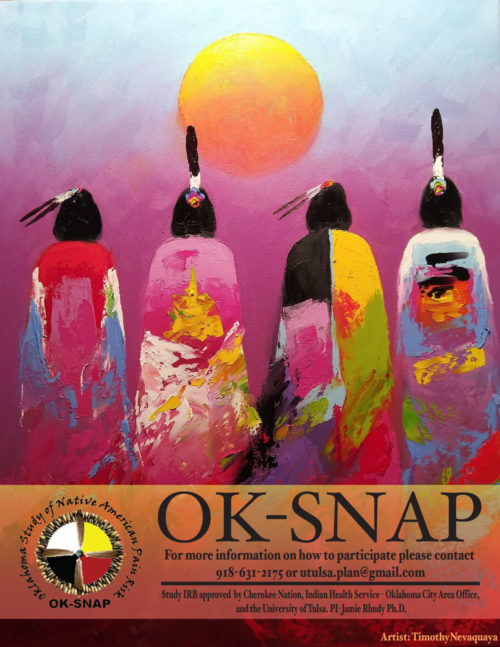Principle Investigators: Dr. Jamie Rhudy, Dr. Joanna Shadlow, Dr. Travis Lowe
This research is supported by the National Institute of Health (NIH) and is approved by The University of Tulsa, Cherokee Nation, and Indian Health Service – Oklahoma City Area Office institutional review boards (IRBs).

The PLAN Lab is currently recruiting healthy, pain-free participants for a 5-year NIH grant-funded study on the impact of sociocultural factors on chronic pain risk mechanisms in Native Americans. We are investigating contributing factors such as historical trauma, environmental stressors, experiences of discrimination, and individual resilience. Participants who complete all aspects of the study are compensated with $425. Individuals travelling from out of town may be eligible for additional travel reimbursement and/or lodging.
Eligible participants must:
- be at least 18 years of age,
- be in good health,
- have no current pain conditions (i.e., frequent, severe headaches, back pain, and/or regularly take prescription pain medications),
- have no health conditions that could interfere with pain testing (i.e., neurological, cardiovascular, and/or circulatory problems), and
- not be taking medications that influence the central nervous system (e.g., narcotic pain meds, stimulants, beta-blockers, antidepressants, anti-anxiety, etc.).
Additional eligibility criteria may apply.
Please call the laboratory at 918-631-3565 to see if you are eligible. If interested, you may also let us know by providing your contact information.
What is it like to participate?
This study requires 4 in-person lab visits and collecting a few at-home stress hormone samples (from spit/saliva). You will work one on one with an experimenter on each visit. Below is a brief outline of study tasks:
Day 1: 3-4 hours
- The experimenter will work with you to determine if inclusion criteria for the study is met. Body measurements will be taken, as well as finger sticks for blood draws. The experimenter will ask you questions about where you have lived in the past and about stressful experiences you have had. You will be taught how to collect your saliva samples and you will complete questionnaires about yourself.
Day 2: 3-4 hours, beginning at 9am or 1pm
- A light meal is provided upon arrival, sensors are applied to your body to measure physiology, and saliva and physiology is collected during public speaking and mental arithmetic tasks. Questionnaires will be administered.
Day 3: 3-4 hours, beginning at the same time you came in for Day 2
- A light meal is provided upon arrival, sensors are applied to your body to measure physiology, and saliva and physiology is collected while you rest. Questionnaires will be administered.
Day 4: about 5 hours
- Sensors are placed on your body and head to measure your physiological reactions to heat, cold, pressure, and electric stimuli. You will complete questionnaires in between measurements.